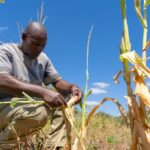
The Central Business District (CBD) in Egypt’s new administrative capital is a model of sustainable development and a good example of friendly cooperation between China and Egypt, according to Chinese officials and Egyptian engineers.
The project, constructed by China State Construction Engineering Corporation (CSCEC), has achieved the goal of sustainable development “in terms of environment and employment,” said Youssry Al-Salamony, an engineer working for Dar Al-Handasah Consultants company, which is responsible for the CBD’s strategic planning.
The project’s design has prioritized environmental and security concerns by using less energy, utilizing more local materials, and managing waste, he said on the sidelines of a conference held in Cairo on Saturday to release the CSCEC’s annual report 2021-2022.
To ensure sustainable development, the project has integrated smart technologies, placed a greater emphasis on using environmentally friendly energies like solar power, and built centralized units of chilled water to conserve electricity, said Ahmed Abdel Raziq, deputy manager of the New Administrative Capital Authority.
Located in a desert some 50 km east of the Egyptian capital Cairo, the CBD covers an area of about 505,000 square meters and is home to dozens of commercial and residential buildings as well as supporting infrastructure. One of the most eye-catching buildings is the CSCEC-built 385.8-meter-tall Iconic Tower, which will become the highest skyscraper in Africa when it is finished.
The CBD project has employed 16,000 workers and engineers, including 12,000 Egyptians and 4,000 Chinese, who have cooperated well despite language hurdles, according to CSCEC.
Mahmoud Rady, deputy quality control manager of CSCEC Egypt, has been working with the company since 2020. The 30-year-old engineer said the eco-friendly technologies used in the CBD project’s planning and implementation are important factors for its success.
“We are committed to contributing to the modernization of our country through carrying out friendly cooperation with China,” he said.
The CBD project has made significant achievements in less than five years, said Ahmed Abdel Raziq, deputy manager of the New Administrative Capital Authority, adding the CSCEC’s work will have a positive effect on Egypt’s construction sector for years ahead.
The CSCEC project has transformed the desert into a vibrant city and serves as a remarkable example of Chinese enterprises’ globalization efforts, said Zhou Zhencheng, the minister counselor of the economic and commercial office at the Chinese Embassy in Cairo.
Over the past four years, the Chinese construction giant has not only focused on green development and environmental protection, but also organized practical training for students and professors from more than 10 Egyptian universities, provided job opportunities for people with special needs, and worked to strengthen the people-to-people exchanges between Egypt and China, according to Zhou.
Calling Egypt an important partner for China, Zhou said China is keen to further its cooperation with Egypt by importing more high-quality products as well as boosting investment and funding.
“The CSCEC has introduced a model of cultural integration and localization of business,” said Chang Weicai, general manager of CSCEC Egypt, adding that CSCEC’s annual report has shed light on the company’s social responsibility for the Egyptian society, the fruitful results of strengthening China-Egypt cooperation, and reflected the deep ties that bind the two peoples together.
“We will continue our tireless efforts to promote the Egyptian-Chinese cooperation in building the Belt and Road Initiative, in realizing the Egyptian 2030 vision … and in employing a significant number of Egyptian workers,” Chang said.





